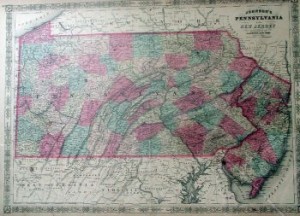 Today the Pennsylvania Baptist Convention, assembled at Salem, reaches back to Roger Williams in declaring their unequivocal support–with the exception of one delegate–for the war against the Confederacy.
Today the Pennsylvania Baptist Convention, assembled at Salem, reaches back to Roger Williams in declaring their unequivocal support–with the exception of one delegate–for the war against the Confederacy.
Whereas, Tho history of Baptists is Interwoven with the history and triumphs of civil and religious liberty; and
Whereas, Our national Government grew out of Baptist polity, exemplified by men of whom Roger Williams was the type at the North, and a little Baptist church near the residence of Thomas Jefferson, from whom he declared he obtained his first ideas of Republican Government, was the type at the South:
Resolved, That we should be derelict to our principles as Baptists, and unworthy sons of worthy sires, If, in this crisis In our existence, we withheld our support, influence, and sympathy from our Government.
2. That it is our duty, both as citizens and Christians, to speak boldly our sentiments with regard to the causes of the existing rebellion, that ministers should speak boldly on the subject, and that those who take offence at such utterances are unworthy of a place in the Christian church.
3. That we, the members of this Convention, as patriots, as Baptists, and as Christians, do express our unqualified support of our National and State Governments, in their efforts to suppress the present rebellion.
4. That we have occasion for gratitude, that not only the full apostolic proportion of eleven-twelfths of the Christian ministry among us are truly loyal Government supporters, but that the mass of the piety of our churches and the intelligence of our country occupy the same position.
5. That the recent victories at the ballot-box should be accepted with thanksgiving to God, as exhibiting the loyalty of the people, and as an evidence of the continued blessing of God on us as a nation.
6. That in the President’s Proclamation of Emancipation, made valid by the exigency which called it forth, and in his recent declaration to abide by it, we see the progress of Christ’s kingdom, which will proclaim liberty to all the earth.
7. That we urge the churches throughout the Commonwealth to observe the last Thursday In November next according to the recommendation of the President, as a day of public Thanksgiving to God.
Same day—This resolution, offered by Rev. J. Wheat on Smith, was adopted:
Whereas, Rev. Joseph Smith, an enrolled delegate to this body, has declared, in our hearing, his belief that the Gospel has no balm for our beloved and bleeding country, and that, in his public ministrations, he finds no place for allusions to our national griefs; therefore,
Resolved, That we commend our brother to a better reading of his Master’s message, and to broader views of pulpit ministration.
Did Thomas Jefferson obtain his Republican ideals from a Baptist church near his residence? Many Baptists of the middle and late nineteenth century think so. J. H. Spencer, a late nineteenth century Baptist historian, recounts the story this way:
Andrew Tribble was born in March, 1741. He was among the first converts to the Baptist faith in his part of the State; and was often heard to remark that he was the fifty-third Baptist on the north side of James river. He commenced preaching soon after he was converted, and about the same time that the Craigs, Waller, Childs and others began their meetings in Elijah Craig’s tobacco barn. He was probably baptized by James Read, and at the time that Elijah Craig and others went to North Carolina and induced him to come to Orange and some of the neighboring counties to baptize the first converts to the Baptist faith in that part of Virginia. He was, for a time, a member of Goldmine church in Louisa county, from which he was sent as a messenger to the first Meeting of the General Association of Virginia, in May, 1771. After this he accepted the pastoral care of a church in Albemarle county. It being near the residence of Thomas Jefferson, that statesman frequently came to Mr. Tribble’s meetings. The Virginians, and especially the able and learned R.B.C. Howell, assert that Mr. Jefferson conceived the idea of a popular government for the American States, while observing the business transactions of the little Baptist church, of which Mr. Tribble was pastor.
The story of Jefferson and the Albemarle church seems to have originated July 14, 1826, ten days after Jefferson’s death as an article in the Christian Watchman newspaper. Although repeated numerous times thereafter (with several variations) and for many years–and allegedly corroborated by Dolley Madison–there is no conclusive evidence for the truth of the story.
Regardless, Jefferson’s ideal of religious liberty for all and church state separation echoed Roger William’s seventeenth century convictions and reflected the views of Baptists since that time, including Baptists of Virgina in the 1760s through 1780s.
Sources: Edward McPherson, The Political History of the United States of America, During the Great Rebellion, Washington: Philp & Solomons, 1865, pp. 477-478 (link); John Henderson Spencer, A History of Kentucky Baptists, 1885, Cincinnati: J. H. Spencer, 1886, p. 129 (link); “Andrew Tribble,” Thomas Jefferson’s Monticello (link)


